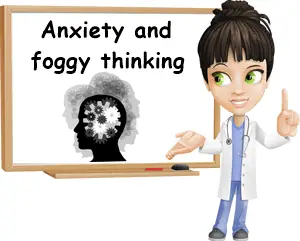Brain fog and anxiety are two very common occurrences nowadays, with the potential to create debilitating symptoms that decrease functioning and affect quality of life. Not surprisingly, they may occur together and their symptoms overlap to the point it becomes difficult to tell which is which. Both brain fog and anxiety start in the mind, but produce physical symptoms as well and range in intensity from mild to severe, with episodes occurring infrequently or frequently or continuing for extended periods of time at once. Causes are diverse and range from chronic stress and sleep deprivation to endocrine dysfunctions, medication side effects, nutritional deficiencies and serious diseases like cancer, depression or stroke.
1) Brain fog and anxiety can occur simultaneously and either one can trigger the other or both be caused by the same factors.
2) Some of the effects of brain fog can overlap with anxiety and vice-versa. For example, more severe brain fog can create feelings of frustration or cause irritability or annoyance. Anxiety disorders can also sometimes result in irritability or frustration when the person suffering from anxiety realizes their fears and worries are unfounded, but still can’t overcome their fears and resume normal activities.
3) Both brain fog and anxiety decrease normal functioning of the person in personal and social contexts and, as such, reduce quality of life.

4) Both conditions start in the brain, in one’s mind, but produce physical effects too. For example, brain fog essentially starts off as cloudy thinking and difficulty concentrating which affects work and learning. But after a while, it becomes so consuming that it actually causes physical tiredness, fatigue (you try and try to work or study, but because of the foggy thinking, you have to put more effort in and this consumes a lot of energy). Anxiety also starts in the mind, with obsessive worrying about future events and fear of the future in general or of people, places, social interactions etc. After some time, all of this thinking and worrying becomes tiresome and leads to physical fatigue.
Also, when it comes to anxiety, future events or otherwise innocuous aspects of daily life generate fear in one’s mind and when confrontation with one’s fears approaches and cannot be avoided (not for lack of trying though), physical manifestations occur. Fast heartbeat, pounding heart sensation, fast, shallow breathing prepare the body to run from danger by supplying more oxygenated blood to muscles.
When more oxygenated blood rushes to legs and arms in preparation of fleeing danger, there is less blood going to the brain, resulting in lightheadedness, dizziness and less going to the stomach, causing a butterflies in the stomach sensation. Fear hormones are produced and released into the bloodstream. Digestion of food no longer is a priority and the body tries to empty the intestinal tract to allow for faster running – hence the sudden urge to have a bowel movement (likely diarrhea because the digestion tract contents are eliminated with urgency) or urinate.

What causes brain fog and anxiety?
Brain fog and anxiety can be triggered by non-pathological factors or underlying medical conditions such as:
1) Stress. Continual, long-term, severe stress is exhausting for the mind and body and will ultimately result in decreased cognitive performance (foggy thinking, difficulty concentrating, decreased functioning and other Brain Fog Symptoms). Normal stress coping mechanisms are also rendered ineffective by continual, chronic stress in the mind of the person subjected to the stress – and this may cause that person to acquire unhealthy traits or develop maladaptive protective mechanisms, such as a pessimistic attitude, which then promote anxiety states.
2) Physical fatigue, exhaustion. Being physically tired requires exceptional resources to continue to avoid rest and sustain all the systems required for activity. And since there is only so much the human body has to offer in terms of resources, physical tiredness will ultimately consume resources destined for the brain too. In the short term, this causes a degradation of the brain’s performance, resulting in foggy thinking, decreased functioning, difficulty concentrating etc. Prolonged fatigue will then also create feelings of irritability, annoyance, frustration, helplessness and predispose to anxiety directed towards the object of frustration (what may be keeping you from resting).
3) Sleep deprivation. Sleep is essential for the good functioning of both the mind and body. Sleeping too little, disturbed sleep or not sleeping will, in time, affect both mental and physical health. Lack of sleep causes the brain to be out of tune and impairs cognitive functions, resulting in foggy, hazy thinking, lack of productivity, lack of motivation, difficulty accomplishing simple task and other symptoms of brain fog. Over time, this can lead to feelings of anxiety that can further be perpetuated by continued sleep deprivation.
4) Underlying conditions. Constant brain fog and anxiety may be an indication of an underlying medical condition. It can be a mental illness, like depression, which is known to occur with anxiety disorder – the two mental conditions combined can put incredible strain on mental health and cognitive performance and ultimately encourage brain fog symptoms (blurred or odd thinking, confusion, lack of motivation, difficulty concentrating etc.). A physical illness can also be extremely consuming both physically and mentally.
Diseases like fibromyalgia are physically exhausting and this alone affects cognitive performance, predisposing to anxiety and brain fog symptoms. A physical illness may also affect mental health directly, such as malabsorption problems which deprive the brain of essential nutrients required for its proper functioning. It is not unheard of for anxiety to be made worse by a severe magnesium and B vitamins deficiency or brain fog to install as a result of a lack of nutrients such as essential fatty acids or amino acids. Repeated hypoglycemia, dehydration and low blood pressure experiences can reduce quality of life to such an extent that they may create a disposition towards anxiety disorders.
A diagnosis of chronic illness such as cancer, heart disease, diabetes, obesity, dementia, Parkinson’s etc. may throw a person off and increase the chances of anxiety disorder, depression, while the effects of medications for chronic conditions can cause impaired brain functions with brain fog symptoms. Sudden mental confusion can occur after a stroke, along with difficulty understanding language, disorientation and other similar brain-fog signs. Endocrine disorders are also very likely to cause anxiety disorders and brain fog as they alter hormone production and, along with it, affect brain function (example: thyroid disorders). So many diseases can impair brain and cognitive functions and lead to fogginess in the head, dizziness, lack of productivity and trigger anxiety feelings. As such, it’s important to seek medical help for any unusual symptoms.
5) Nutritional deficiencies cause anxiety and brain fog and may also revert them (unless there are other causes too, in which case those need to be addressed as well). Magnesium and B vitamins, essential fatty acids (like Omega-3 from fish) and essential and non-essential amino acids (which make up protein) are responsible for clear, sharp thinking, support cognitive functions and provide benefits for mood, contributing to emotional health. Stress and disease, working too much or sleeping too little deplete our resources of nutrients such as B vitamins and magnesium and can encourage symptoms of brain fog and anxiety.
A balanced nutrition providing all essential micro and macronutrients in generous amounts can help prevent brain fog and anxiety. Also see 9 Surprising Anti-Anxiety Herbal Remedies and read these great 10 Brain Fog Remedies.
Supplementing as per your requirements during more stressful periods in your life, for example, and learning to reduce stress are also great way to prevent brain fog and anxiety.
6) Medicine side effects. Anesthetics, pain-relief medication, antihistamines and allergy medication, antacids, proton pump inhibitors, blood thinners, depression, anxiety, attention deficit and other mental illness medication, chemotherapy medicines, insomnia treatments, hormone therapies and so many others can affect how our brain works by blocking certain neurotransmitters, altering hormone levels etc. and easily cause anxiety and foggy head, confusion, forgetfulness, lethargy, difficulty focusing and so on. Read the label carefully and talk to your doctor more about the side effects of medicines you may be taking.
Conclusion
A dizzy, foggy head feeling, fatigue and anxiety are not normal and best investigated by a medical professional. When your mind feels unusually foggy and without an apparent reason, it is best to make an appointment with your doctor and have some tests done to find out the cause behind it. If you are also experiencing anxiety feelings, it’s all the more important to seek medical help. It may be a result of the stress you’re experiencing lately or because of not sleeping enough, or it may be something else. For example, if you’re lightheaded, dizzy and experience head pressure in addition to cloudy thinking, it may be an infection, concussion or a more serious condition, so see your doctor soon.
